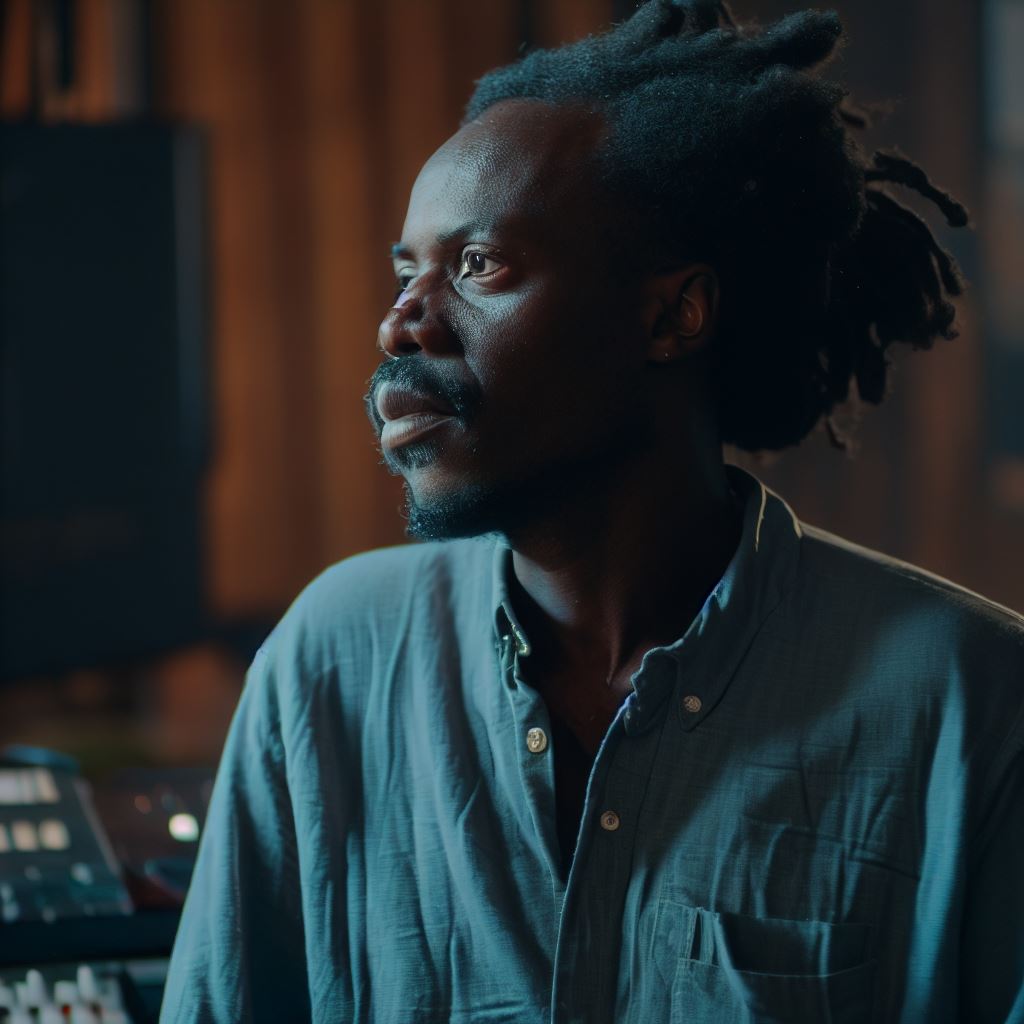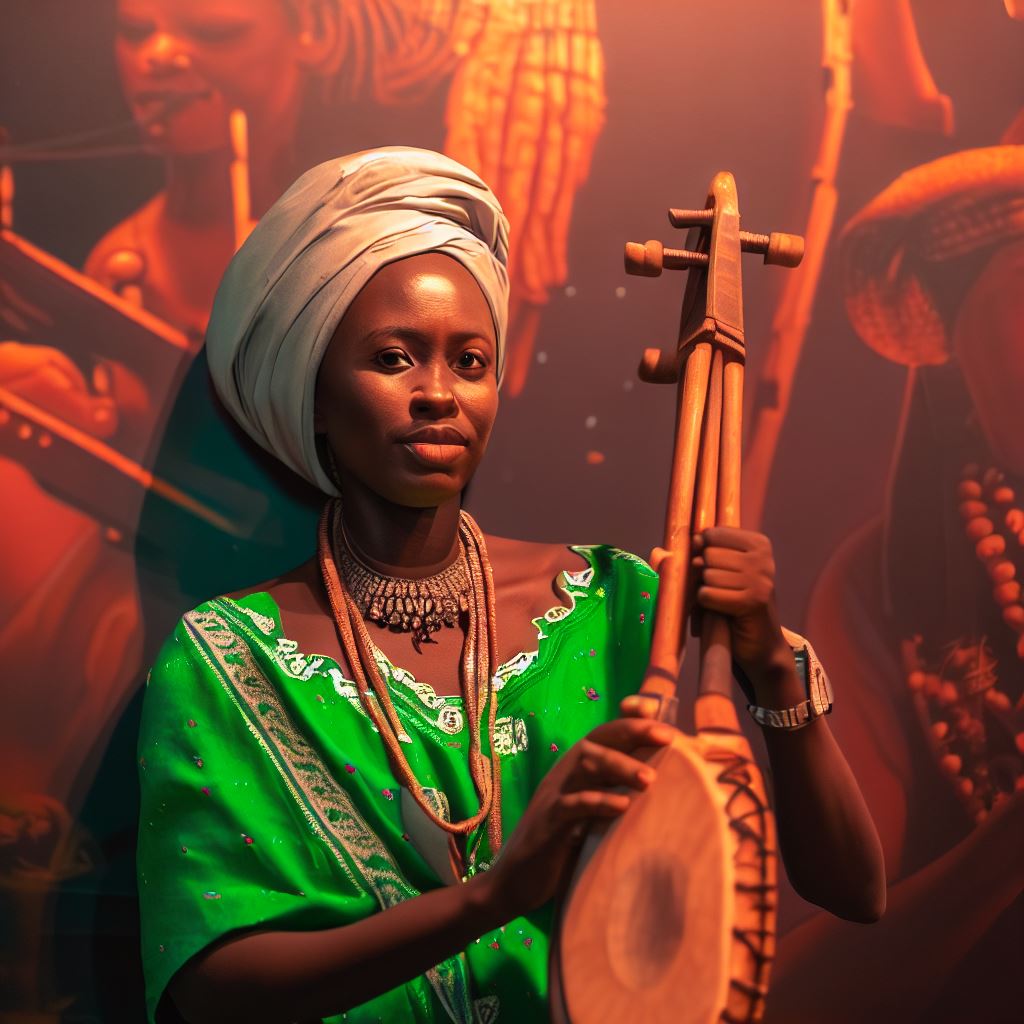Introduction
Let’s explore the power of music in Nigerian film narratives.
The Nigerian film industry, also known as Nollywood, has experienced significant growth and popularity in recent years.
Music in film narratives refers to the use of soundtracks and scores to enhance storytelling and evoke emotions.
In the heart of Nigeria’s vibrant cinematic landscape lies an enchanting interplay of visuals and sounds, where storytelling transcends mere narration, and emotions find their voice in the cadence of music.
This dynamic fusion, where the power of music converges with the narratives of Nigerian cinema, forms a compelling tapestry that not only entertains but also resonates on a deeply cultural and emotional level.
Through intricate melodies, pulsating rhythms, and rich orchestrations, Nigerian film composers have carved out a distinctive niche, shaping narratives with a unique sonic signature.
Having a strong musical presence in films helps engage the audience and create a more immersive experience.
This synthesis of auditory and visual artistry serves as a testament to the profound impact of music in Nigerian film, offering audiences an immersive experience that transcends the screen and lingers in the soul.
Music plays a significant role in enhancing the narrative impact of Nigerian films, making them more captivating and emotionally resonant.
In this exploration, we delve into the intricacies of this phenomenon, uncovering the ways in which music serves as a cornerstone in the storytelling traditions of Nigerian cinema, ultimately enriching the viewer’s journey into the heart of these narratives.
Historical Context of Nigerian Film Industry
Origin and growth of Nollywood
- Nigerian film industry, popularly known as Nollywood, originated in the late 1960s.
- It was born out of the need to tell stories that reflect the everyday experiences of Nigerians.
- Nollywood quickly grew to become the second-largest film industry in the world, after Hollywood.
- Its growth can be attributed to the affordability and accessibility of video technology.
- The industry flourished despite limited resources and infrastructural challenges.
Evolution of Nigerian film narratives
- Nigerian film narratives initially focused on societal issues, culture, and identity.
- The early films portrayed the struggles and aspirations of the Nigerian people, often addressing political themes.
- As the industry evolved, narratives started to include a wider range of genres, such as romance, comedy, and action.
- The narratives became more diverse and reflected the cultural diversity of Nigeria’s various ethnic groups.
- Nigerian filmmakers began exploring universal themes that could resonate with a global audience.
Emergence of music as a crucial narrative element
- Music has always been an integral part of Nigerian culture and society.
- In Nigerian films, music serves multiple purposes, such as enhancing emotional depth and capturing the essence of scenes.
- Music in Nigerian film narratives is not only limited to background scores but also extends to song and dance sequences.
- The inclusion of music in films helps to engage and captivate the audience, creating a more immersive experience.
- Nigerian filmmakers have recognized the power of music in shaping the overall narrative and evoke specific emotions.
Read: Film Composing: A Career with Global Impact
The Function of Music in Nigerian Film Narratives
Setting the mood and atmosphere
Traditional music styles are utilized to establish the desired mood and atmosphere.
Contemporary genres are infused into the music to add a modern touch to the narrative.
Enhancing cultural authenticity
Local musical instruments are incorporated to create an authentic Nigerian sound.
The music reflects Nigerian cultural values, reinforcing the film’s cultural authenticity.
Conveying emotions and amplifying dramatic moments
Background scores are carefully selected to evoke specific emotions and enhance the narrative.
Music cues, such as suspenseful melodies, are used to build tension leading up to climactic scenes.
Examples of Music in Nigerian Film Narratives
Iconic films showcasing the power of music
Nigerian film narratives have a long-standing tradition of integrating music to enhance storytelling.
These examples of iconic films illustrate the undeniable power that music holds in Nigerian cinema.
“Oliver Twist” (1999) is a classic film that effectively uses music to express emotions and highlight cultural themes.
“The Figurine” (2009) masterfully incorporates music to build tension and create a haunting atmosphere.
“King of Boys” (2018) showcases the power of music in accentuating the intense and dramatic moments of the film.
Notable composers and artists in Nigerian film industry
In addition to these films, the Nigerian film industry boasts notable composers and artists whose contributions have greatly enriched the cinematic experience.
Fela Kuti, often referred to as the pioneer of Afrobeat music, has made a significant impact on Nigerian film narratives.
His music, known for its blend of traditional African rhythms and Western influences, has been featured in various films, adding depth and vibrancy to the storytelling.
Another notable musician and composer in the Nigerian film industry is Niyi Adeniran.
Adeniran’s work as a composer and music director has been instrumental in capturing the essence of Nigerian film narratives.
His ability to compose music that perfectly complements the visuals and enhances the overall storytelling aspect is highly regarded.
Both Fela Kuti and Niyi Adeniran are just a few examples of the talented individuals who have shaped the music landscape in Nigerian film narratives.
Their contributions have not only enhanced the cinematic experience for audiences but also elevated the cultural significance of Nigerian cinema on the international stage.
The integration of music in Nigerian film narratives goes beyond mere entertainment.
It serves as a powerful tool for conveying emotions, driving the plot, and capturing the essence of Nigerian culture.
The use of music in films provides a deeper understanding of the characters’ motivations and experiences, making the storytelling more relatable and impactful for audiences.
Read: Collaborating as a Composer in Nigerian Cinema

Learn More: Foley Artistry: A Hidden Profession Boosting Nigeria’s Film Success
Impact of Music on Nigerian Film Narratives
Engaging the audience emotionally
- Music plays a crucial role in Nigerian film narratives by engaging the audience emotionally.
- The right choice of music enhances the mood and atmosphere of a scene.
- Upbeat music can evoke excitement and joy, while somber tunes create a sense of sadness.
- By manipulating the emotional connection through music, filmmakers can intensify the impact of a narrative.
Connecting with Nigerian cultural identity
- Nigerian music, deeply rooted in diverse cultural traditions, helps create a sense of authenticity in film narratives.
- Incorporating traditional Nigerian instruments and rhythms brings out the cultural identity of the characters and setting.
- This connection fosters a stronger bond between the audience and the story being told.
- Music becomes a way to showcase and preserve Nigerian cultural heritage within the global film industry.
Establishing a distinct cinematic experience
- Music adds depth to Nigerian film narratives, distinguishing them from other cinematic traditions.
- Nigerian film soundtracks often blend traditional elements with contemporary genres like Afrobeat and highlife.
- This unique blend creates a distinct cinematic experience that sets Nigerian films apart from the rest.
- The fusion of different musical styles enhances the overall aesthetic and storytelling of the film.
Contributing to the success of Nigerian films globally
- Music plays a significant role in the global success of Nigerian films.
- Nigerian music, particularly Afrobeat, has gained popularity worldwide, attracting international audiences.
- The infectious soundtracks of Nigerian films captivate viewers, making them more inclined to explore the culture and cinema.
- By incorporating music deeply rooted in Nigerian culture, films can stand out internationally, increasing their global appeal.
In fact, the impact of music on Nigerian film narratives cannot be overstated. It engages the audience emotionally, connects with Nigerian cultural identity, establishes a distinct cinematic experience, and contributes to the success of Nigerian films globally.
By harnessing the power of music, Nigerian filmmakers create immersive and compelling narratives that resonate with audiences both at home and abroad.
Read: Case Study: Successful Film Scores in Nigeria
Challenges and Future Directions
Balancing tradition and contemporary elements
- Nigerian film narratives face the challenge of incorporating both traditional and contemporary music styles.
- Filmmakers must strike a balance to respect cultural heritage while appealing to a modern audience.
- Adapting traditional music to contemporary film narratives requires careful consideration and expertise.
- It is essential to preserve the integrity of Nigerian musical traditions while embracing innovation and evolution.
- The challenge lies in presenting Nigerian music in a way that is both authentic and fresh.
Exploring diverse musical genres in narratives
- Nigerian filmmakers should continue to explore diverse musical genres to enrich their film narratives.
- Incorporating different genres like Afrobeat, Juju, Highlife, and Hip Hop offers a unique and culturally rich experience.
- This diversity allows for the exploration of various themes and enhances the emotional impact of the narratives.
- Filmmakers can experiment with blending different musical genres to create a unique sonic experience.
- By embracing a wide range of musical styles, Nigerian film narratives can cater to a broader audience.
Embracing technological advancements for enhanced music production
- Technological advancements offer exciting opportunities for enhanced music production in Nigerian film narratives.
- The use of advanced recording equipment and software can improve the overall quality of the music.
- Filmmakers can collaborate with skilled sound engineers to achieve a more professional and polished sound.
- Virtual instruments and digital compositions provide flexibility and creativity in music production.
- Embracing these advancements can elevate the impact of music in Nigerian film narratives.
In a nutshell, Nigerian film narratives face the challenge of balancing tradition and contemporary elements in terms of music.
Filmmakers must explore diverse musical genres to enrich their narratives and cater to a broader audience.
Embracing technological advancements can enhance the overall production and impact of music in Nigerian films.
By overcoming these challenges and embracing future directions, Nigerian filmmakers can harness the power of music to create compelling and culturally significant narratives.
Read: Diversity in Nigerian Film Composing: A Closer Look
Learn More: Exploring Nigeria’s Film Industry through Hair Styling
Conclusion
Music plays a significant role in Nigerian film narratives by enhancing emotions, conveying cultural identities, and creating a sense of unity.
It is important to acknowledge and appreciate how music contributes to the success and impact of Nigerian films.
As the power of music in Nigerian film narratives is vast, more research and exploration should be done to uncover its potential and significance.
In summary, music in Nigerian film narratives holds great power and impact.
It is a tool for emotional and cultural expression, and it unifies audiences. Recognizing and appreciating the role of music in Nigerian films is essential.
Furthermore, there is a need for further exploration and research to fully understand and harness the potential of music in this context.




